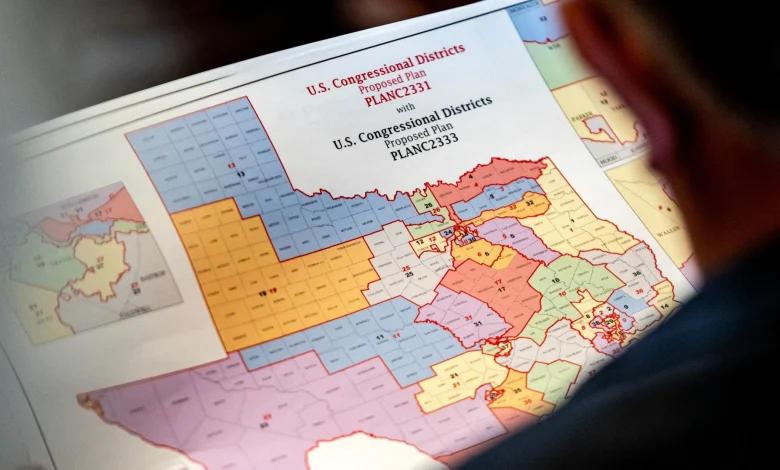Federal court blocks new Texas congressional map for 2026

Audio recording is automated for accessibility. Humans wrote and edited the story. See our AI policy, and give us feedback.
Texas cannot use its new congressional map for the 2026 election and will instead need to stick with the lines passed in 2021, a three-judge panel ruled Tuesday.
The decision is a major blow for Republicans, in Texas and nationally, who pushed through this unusual mid-decade redistricting at the behest of President Donald Trump. They were hoping the new map would yield control of 30 of the state’s 38 congressional districts — up from the 25 they currently hold — and help protect the narrow GOP majority in the U.S. House.
“The public perception of this case is that it’s about politics,” U.S. Judge Jeffrey Brown, a Trump appointee, wrote in the ruling striking down the new lines. “To be sure, politics played a role in drawing the 2025 Map. But it was much more than just politics. Substantial evidence shows that Texas racially gerrymandered the 2025 Map.”
Brown ordered that the 2026 congressional election “shall proceed under the map that the Texas Legislature enacted in 2021.” Attorney General Ken Paxton said in a statement that his office would ask the U.S. Supreme Court to reverse the ruling and allow the map to go into effect. But time is short: Candidates only have until Dec. 8 to file for the upcoming election.
The map cleared the GOP-controlled Legislature in August and was quickly signed into law by Gov. Greg Abbott. Several advocacy groups sued over the new district lines, saying lawmakers intentionally diluted the voting power of Black and Hispanic Texans and drew racially gerrymandered maps. Over the course of a nine-day hearing in El Paso last month, they aimed to convince the judges that it was in voters’ best interest to shelve the new map until a full trial could be held.
“A federal court just stopped one of the most brazen attempts to steal our democracy that Texas has ever seen,” Texas House Minority Leader Gene Wu, D-Houston, said in a statement. “Greg Abbott and his Republican cronies tried to silence Texans’ voices to placate Donald Trump, but now have delivered him absolutely nothing.”
It was not immediately clear if the state still has a legal path to restoring the new map in time for 2026. Unlike most federal lawsuits, which are heard by a single district judge and then appealed to a circuit court, voting rights lawsuits are initially heard by two district judges and one circuit judge, and their ruling can only be appealed directly to the U.S. Supreme Court.
Tuesday’s decision came from a three-judge panel made up of Brown — a former Texas Supreme Court justice who once clerked for Abbott — and U.S. District Judge David Guaderrama, a Barack Obama appointee. Judge Jerry Smith, who was appointed to the 5th U.S. Circuit Court of Appeals by Ronald Reagan, cast a dissenting vote and was expected to soon issue his own opinion.
The ruling comes 10 days into the monthlong period when candidates can sign up for the March primary.
In the meantime, the ruling has set off a cascade of political maneuvering among members of both parties who had been operating under the notion that the Republican map would stick. Democrats, rather than facing retirement or primaries against fellow incumbents, are now freed up to run in their current districts. The bevy of Republican candidates who had signed up to run in districts newly drawn to favor them will now have to hope for an intervention from the Supreme Court or face far less favorable election prospects.
Austin Democrats Greg Casar and Lloyd Doggett had engaged in a shadow primary over the summer over who would represent the remaining Austin Democratic seat, an amalgamation of their two current seats. Doggett ultimately announced he would retire if the maps were upheld, clearing the way for Casar.
But after the court’s ruling, Casar said in a statement that he would run in his old district, Texas’ 35th Congressional District, provided the decision stands, clearing the way for Doggett to remain in Congress in the 37th Congressional District.
“The Trump Abbott maps are clearly illegal, and I’m glad these judges have blocked them,” Casar said. “If this decision stands, I look forward to running for reelection in my current district.”
The map ruling would also resolve an emerging primary in Texas’ 18th Congressional District, where Harris County Attorney Christian Menefee and former Houston City Council member Amanda Edwards are competing in a Jan. 31 runoff to finish out deceased Rep. Sylvester Turner’s term. Rep. Al Green, D-Houston, had filed to run in the newly drawn 18th Congressional District, setting up a clash with either Menefee or Edwards. But Green could now run in his current district, the 9th Congressional District, and avoid that scenario.
This is just the opening gambit in what promises to be a yearslong legal battle over Texas’ congressional map. A lawsuit over the state’s 2021 redistricting — including its state legislative and education board seats — went to trial earlier this summer and remains pending before the same three-judge panel. The judges have indicated they may want to see how the U.S. Supreme Court rules on a major voting rights case before issuing their full ruling on Texas’ maps.
But for Trump, and many of his Republican supporters in Texas, the short-term goal of having this map for the 2026 election was as important as the long game.
“I’m convinced that if Texas does not take this action, there is an extreme risk that [the] Republican majority will be lost,” Sen. Phil King, R-Weatherford, said on the floor of the state Senate before the new map passed. “If it does, the next two years after the midterm, there will be nothing but inquisitions and impeachments and humiliation for our country.”
The state had argued that the entire redistricting process was based on a partisan goal, which the U.S. Supreme Court has previously said courts cannot intervene to prevent. But the plaintiffs pointed to a letter sent from the U.S. Department of Justice directing Texas to redraw its maps to eradicate four majority non-white districts, arguing that was the original sin that cast a racially discriminatory pall over the whole process.
In Tuesday’s ruling, Brown said it was difficult to analyze the DOJ letter because it contained “so many factual, legal and typographical errors.” But the fact that state leaders had pointed to that letter repeatedly as the impetus for redistricting was enough, the judges said.
“The Governor explicitly directed the Legislature to draw a new U.S. House map to resolve DOJ’s concerns. In other words, the Governor explicitly directed the Legislature to redistrict based on race,” Brown wrote on behalf of the judges. “In press appearances, the Governor plainly and expressly disavowed any partisan objective and instead repeatedly stated that his goal was to eliminate coalition districts and create new majority-Hispanic districts.”
Abbott said in a statement that it was “absurd” to say the maps were drawn with discriminatory intent.
“The Legislature redrew our congressional maps to better reflect Texans’ conservative voting preferences – and for no other reason,” he said. “This ruling is clearly erroneous and undermines the authority the U.S. Constitution assigns to the Texas Legislature by imposing a different map by judicial edict.”
Chad Dunn, a lawyer for the plaintiffs, said he felt the state would have limited success at the high court.
“Everyone involved said they were drawing the lines on the basis of race,” he said. “I don’t see how the Supreme Court sets that aside.”
Tuesday’s ruling comes two weeks after California voters greenlit the state’s retaliatory map that aimed to offset Texas’ GOP gains by carving out five new Democratic congressional districts in the Golden State. California Gov. Gavin Newsom, who spearheaded the plan, traveled to Houston earlier this month for a victory lap to celebrate his state’s passage of Proposition 50, which cleared the way for the California Legislature to approve new congressional boundaries.
“Donald Trump and Greg Abbott played with fire, got burned — and democracy won,” Newsom said in a statement Tuesday. “This ruling is a win for Texas and for every American who fights for free and fair elections.”





